Best student credit cards in Canada 2024
Fact Checked: Tyler Wade
Updated: October 21, 2024
Here's how to pick a student credit card and our list of the best credit cards for young adults in Canada.
Establishing strong credit from an early age is crucial for your financial future. For young adults with little to no income, there are excellent student credit card options that provide benefits including cash back, travel rewards and discounts. Here's our list and tips on how to make your pick.
Best credit card for students overall
RBC ION+ Visa
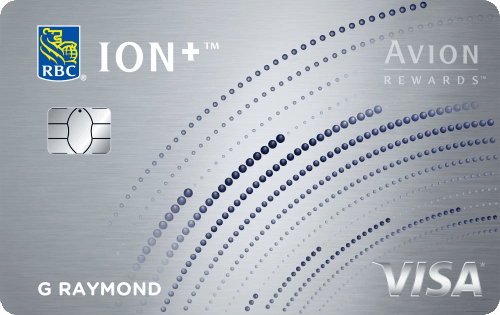
3.2
12,000 pts
Welcome offerGood
Suggested credit scoreto receive the latest news, tips and offers by email
Pros
-
Decent rewards rate in everyday spending categories.
-
Low monthly fee, (rebated for students with the RBC AdvantageTM Banking Account for students).
-
Perks like mobile device insurance and fuel savings at Petro-Canada.
Cons
-
Complex rewards structure with less valuable Avion points in the ION tier.
-
Limited insurance benefits (but you can pay to add-on travel insurance).
Eligibility
Good
Recommended Credit Score
Recommended Credit Score
Good
3
Avion Ion points† per $1 on qualifying grocery, dining, food delivery, gas, rideshare, public transit, EV charging, streaming, digital gaming and online subscriptions
1
Avion Ion point per $1 on all other purchases
Avion Ion points† per $1 on qualifying grocery, dining, food delivery, gas, rideshare, public transit, EV charging, streaming, digital gaming and online subscriptions
3
Avion Ion point per $1 on all other purchases
1
20.99%
Purchase APR
22.99%
Balance Transfer Rate
22.99%
Cash Advance APR 21.99% for residents of Quebec
$48
Annual Fee $4 per month
2.5%
Foreign Transaction Fee 2.5% of the transaction in CDN
Purchase APR
20.99%
Balance Transfer Rate
22.99%
Cash Advance APR
22.99%
Annual Fee
$48
Foreign Transaction Fee
2.5%
Pros
-
Decent rewards rate in everyday spending categories.
-
Low monthly fee, (rebated for students with the RBC AdvantageTM Banking Account for students).
-
Perks like mobile device insurance and fuel savings at Petro-Canada.
Cons
-
Complex rewards structure with less valuable Avion points in the ION tier.
-
Limited insurance benefits (but you can pay to add-on travel insurance).
Eligibility
Good
Recommended Credit Score
Recommended Credit Score
Good
3
Avion Ion points† per $1 on qualifying grocery, dining, food delivery, gas, rideshare, public transit, EV charging, streaming, digital gaming and online subscriptions
1
Avion Ion point per $1 on all other purchases
Avion Ion points† per $1 on qualifying grocery, dining, food delivery, gas, rideshare, public transit, EV charging, streaming, digital gaming and online subscriptions
3
Avion Ion point per $1 on all other purchases
1
20.99%
Purchase APR
22.99%
Balance Transfer Rate
22.99%
Cash Advance APR 21.99% for residents of Quebec
$48
Annual Fee $4 per month
2.5%
Foreign Transaction Fee 2.5% of the transaction in CDN
Purchase APR
20.99%
Balance Transfer Rate
22.99%
Cash Advance APR
22.99%
Annual Fee
$48
Foreign Transaction Fee
2.5%
Best RBC student credit card
RBC Cash Back Mastercard
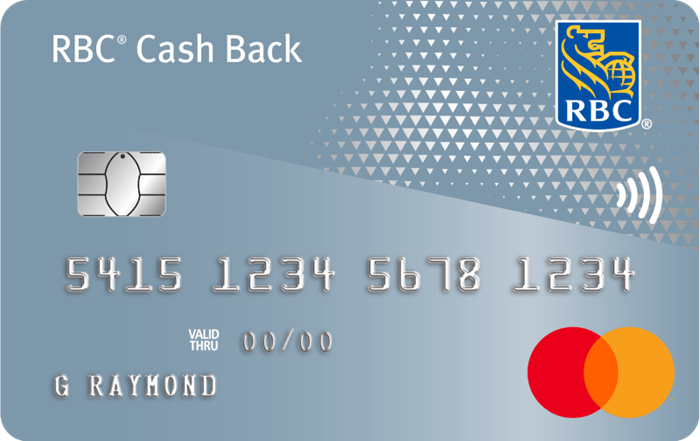
3.2
Good
Suggested credit scoreto receive the latest news, tips and offers by email
Pros
-
No annual fee, no fee for additional cardholders
-
Up to 2% cash back on groceries², up to 1% cash back on everything else²
-
No limit on cash back earned¹
-
Save money on gas at Petro-Canada⁵
-
Easy approval requirements
Cons
-
Cash back rewards on groceries drop to 1% after you accumulate $6,000 in grocery charges
-
No travel insurance or other perks
-
No welcome bonus
-
0.5% applies to the cash back on everything else up to $6,000 but what is impressive is that for all non-grocery spend the cash back rate actually goes up from the 0.5% to 1% on spend over $6,000, rewarding as your spend more instead of diminishing
-
No travel insurance or other perks
-
No welcome bonus
Eligibility
Good
Recommended Credit Score
Recommended Credit Score
Good
2%
Up to 2% unlimited cash back on groceries
1%
Up to 1% unlimited cash back on everything else
$0.03
Link your card and instantly save 3¢/L on fuel and 20% more Petro-Points at Petro Canada
50
Get 50 Be Well points for every $1 spent on eligible products at Rexall
Up to 2% unlimited cash back on groceries
2%
Up to 1% unlimited cash back on everything else
1%
Link your card and instantly save 3¢/L on fuel and 20% more Petro-Points at Petro Canada
$0.03
Get 50 Be Well points for every $1 spent on eligible products at Rexall
50
20.99%
Purchase APR
22.99%
Balance Transfer Rate 21.99% if you reside in Quebec
22.99%
Cash Advance APR 21.99% if you reside in Quebec
$0
Annual Fee No annual fee
2.5%
Foreign Transaction Fee 2.5% of the transaction in CDN
Purchase APR
20.99%
Balance Transfer Rate
22.99%
Cash Advance APR
22.99%
Annual Fee
$0
Foreign Transaction Fee
2.5%
Pros
-
No annual fee, no fee for additional cardholders
-
Up to 2% cash back on groceries², up to 1% cash back on everything else²
-
No limit on cash back earned¹
-
Save money on gas at Petro-Canada⁵
-
Easy approval requirements
Cons
-
Cash back rewards on groceries drop to 1% after you accumulate $6,000 in grocery charges
-
No travel insurance or other perks
-
No welcome bonus
-
0.5% applies to the cash back on everything else up to $6,000 but what is impressive is that for all non-grocery spend the cash back rate actually goes up from the 0.5% to 1% on spend over $6,000, rewarding as your spend more instead of diminishing
-
No travel insurance or other perks
-
No welcome bonus
Eligibility
Good
Recommended Credit Score
Recommended Credit Score
Good
2%
Up to 2% unlimited cash back on groceries
1%
Up to 1% unlimited cash back on everything else
$0.03
Link your card and instantly save 3¢/L on fuel and 20% more Petro-Points at Petro Canada
50
Get 50 Be Well points for every $1 spent on eligible products at Rexall
Up to 2% unlimited cash back on groceries
2%
Up to 1% unlimited cash back on everything else
1%
Link your card and instantly save 3¢/L on fuel and 20% more Petro-Points at Petro Canada
$0.03
Get 50 Be Well points for every $1 spent on eligible products at Rexall
50
20.99%
Purchase APR
22.99%
Balance Transfer Rate 21.99% if you reside in Quebec
22.99%
Cash Advance APR 21.99% if you reside in Quebec
$0
Annual Fee No annual fee
2.5%
Foreign Transaction Fee 2.5% of the transaction in CDN
Purchase APR
20.99%
Balance Transfer Rate
22.99%
Cash Advance APR
22.99%
Annual Fee
$0
Foreign Transaction Fee
2.5%
Best CIBC student credit card in Canada
CIBC Dividend® Visa* Card for Students

3.5
10% back
Welcome offerGood
Suggested credit scoreGet up to 10% cash back for the first 4 statements on total purchases of up to $1,000.†
Pros
-
Earn cashback on everyday purchases
-
Enjoy a Welcome Bonus
-
Redeem cash back at any time when you have a minimum of $25 through CIBC Online and Mobile Banking®†
-
Included SPC+ membership for eligible students†
Cons
-
Similar APR to other non-student cards
Eligibility
Good
Recommended Credit Score
$0†
Required Annual Personal Income
Recommended Credit Score
Good
Required Annual Personal Income
$0†
2%
cash back on eligible grocery purchases!†
1%
cash back on eligible gas, EV charging, transportation, dining purchases and recurring payments†
0.5%
cash back on all other purchases†
cash back on eligible grocery purchases!†
2%
cash back on eligible gas, EV charging, transportation, dining purchases and recurring payments†
1%
cash back on all other purchases†
0.5%
20.99%†
Purchase APR
22.99%†
Balance Transfer Rate
22.99%†
Cash Advance APR
$0
Annual Fee No annual fee
2.5%
Foreign Transaction Fee 2.5% of the transaction in CDN
Purchase APR
20.99%†
Balance Transfer Rate
22.99%†
Cash Advance APR
22.99%†
Annual Fee
$0
Foreign Transaction Fee
2.5%
Pros
-
Earn cashback on everyday purchases
-
Enjoy a Welcome Bonus
-
Redeem cash back at any time when you have a minimum of $25 through CIBC Online and Mobile Banking®†
-
Included SPC+ membership for eligible students†
Cons
-
Similar APR to other non-student cards
Eligibility
Good
Recommended Credit Score
$0†
Required Annual Personal Income
Recommended Credit Score
Good
Required Annual Personal Income
$0†
2%
cash back on eligible grocery purchases!†
1%
cash back on eligible gas, EV charging, transportation, dining purchases and recurring payments†
0.5%
cash back on all other purchases†
cash back on eligible grocery purchases!†
2%
cash back on eligible gas, EV charging, transportation, dining purchases and recurring payments†
1%
cash back on all other purchases†
0.5%
20.99%†
Purchase APR
22.99%†
Balance Transfer Rate
22.99%†
Cash Advance APR
$0
Annual Fee No annual fee
2.5%
Foreign Transaction Fee 2.5% of the transaction in CDN
Purchase APR
20.99%†
Balance Transfer Rate
22.99%†
Cash Advance APR
22.99%†
Annual Fee
$0
Foreign Transaction Fee
2.5%
Best TD credit card for students in Canada
TD Rewards Visa* Card
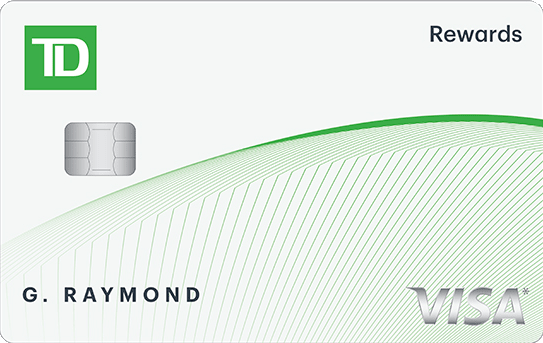
3.2
up to $50
Welcome offerExcellent
Suggested credit scoreEarn a value of $50† in TD Rewards Points† to use on eligible Amazon.ca purchases plus, no Annual Fee. Conditions Apply. Account must be approved by January 6 2025.
Expires
Jan 6, 2025
Pros
-
Wide range of point redemption options, including travel†, Amazon.ca†, online retailers†, card statement credits†, etc.
-
Good rate of return on spending and redeeming via the travel platform Expedia® For TD†
-
Decent value for those that have a high volume of recurring bills
Cons
-
Point redemption values are moderate to poor
-
Low spending limits for earning extra points on groceries and restaurants
-
High credit score requirement
Eligibility
Excellent
Recommended Credit Score
$0
Required Annual Personal Income
$0
Required Annual Household Income
Recommended Credit Score
Excellent
Required Annual Personal Income
$0
Required Annual Household Income
$0
4 Points
Earn 4 TD Rewards Points for every $1 you spend on travel through ExpediaForTD.com†
3 Points
Earn 3 TD Rewards Points for every $1 you spend on groceries and restaurants†
2 Points
Earn 2 TD Rewards Points for every $1 you spend on recurring bills†
1 Points
Earn 1 TD Rewards Point for every $1 you spend on all other purchases†
50%
Earn 50% more TD Rewards Points and 50% more Stars at Starbucks†
Earn 4 TD Rewards Points for every $1 you spend on travel through ExpediaForTD.com†
4 Points
Earn 3 TD Rewards Points for every $1 you spend on groceries and restaurants†
3 Points
Earn 2 TD Rewards Points for every $1 you spend on recurring bills†
2 Points
Earn 1 TD Rewards Point for every $1 you spend on all other purchases†
1 Points
Earn 50% more TD Rewards Points and 50% more Stars at Starbucks†
50%
19.99%
Purchase APR APR for purchases 19.99%†
22.99%
Balance Transfer Rate APR for balance transfers 22.99%†
22.99%
Cash Advance APR APR for cash advances 22.99%†
$0
Annual Fee Additional cardholder is $0
2.5%
Foreign Transaction Fee 2.5% of the transaction in CND
Purchase APR
19.99%
Balance Transfer Rate
22.99%
Cash Advance APR
22.99%
Annual Fee
$0
Foreign Transaction Fee
2.5%
Pros
-
Wide range of point redemption options, including travel†, Amazon.ca†, online retailers†, card statement credits†, etc.
-
Good rate of return on spending and redeeming via the travel platform Expedia® For TD†
-
Decent value for those that have a high volume of recurring bills
Cons
-
Point redemption values are moderate to poor
-
Low spending limits for earning extra points on groceries and restaurants
-
High credit score requirement
Eligibility
Excellent
Recommended Credit Score
$0
Required Annual Personal Income
$0
Required Annual Household Income
Recommended Credit Score
Excellent
Required Annual Personal Income
$0
Required Annual Household Income
$0
4 Points
Earn 4 TD Rewards Points for every $1 you spend on travel through ExpediaForTD.com†
3 Points
Earn 3 TD Rewards Points for every $1 you spend on groceries and restaurants†
2 Points
Earn 2 TD Rewards Points for every $1 you spend on recurring bills†
1 Points
Earn 1 TD Rewards Point for every $1 you spend on all other purchases†
50%
Earn 50% more TD Rewards Points and 50% more Stars at Starbucks†
Earn 4 TD Rewards Points for every $1 you spend on travel through ExpediaForTD.com†
4 Points
Earn 3 TD Rewards Points for every $1 you spend on groceries and restaurants†
3 Points
Earn 2 TD Rewards Points for every $1 you spend on recurring bills†
2 Points
Earn 1 TD Rewards Point for every $1 you spend on all other purchases†
1 Points
Earn 50% more TD Rewards Points and 50% more Stars at Starbucks†
50%
19.99%
Purchase APR APR for purchases 19.99%†
22.99%
Balance Transfer Rate APR for balance transfers 22.99%†
22.99%
Cash Advance APR APR for cash advances 22.99%†
$0
Annual Fee Additional cardholder is $0
2.5%
Foreign Transaction Fee 2.5% of the transaction in CND
Purchase APR
19.99%
Balance Transfer Rate
22.99%
Cash Advance APR
22.99%
Annual Fee
$0
Foreign Transaction Fee
2.5%
Best Scotiabank student credit card
Scotia Momentum No-Fee Visa Card
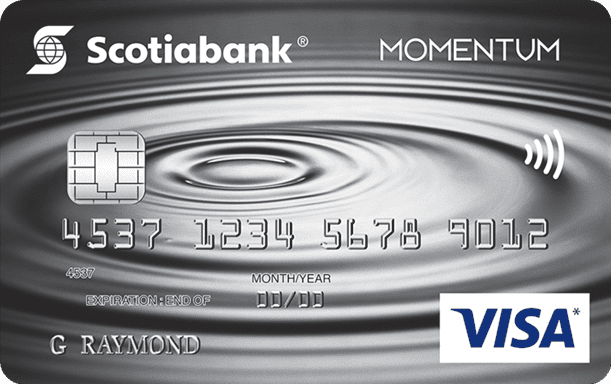
3.0
5% cash back
Welcome offerFair
Suggested credit scoreEarn 5% cash back on all purchases for the first 3 months (up to $2,000 in total purchases); Plus, get a 0% introductory interest rate on balance transfers for the first 6 months (22.99% after that; annual fee $0)
Expires
Nov 1, 2024
Pros
-
No annual fee: The card does not charge an annual fee, making it cost-effective for users.
-
Cash back rewards: Offers 1% cash back on eligible gas, groceries, drugstore purchases and recurring bill payments.
-
Welcome bonus: There is a welcome bonus of 5% cash back on up to $2,000 in eligible purchases within the first three months.
-
Promotional balance Transfer Rate: A promotional 0% annual interest rate on balance transfers for the first six months (with a 2% balance transfer fee).
-
Rental car discounts: Cardholders can save up to 25% off base rates at participating AVIS and Budget locations in Canada and the U.S.
Cons
-
Limited insurance: No included insurance coverage, though optional insurance bundles are available for a fee.
-
Low base rewards rate: After exceeding the $25,000 spending cap, the cash back rewards drop to a base rate of 0.5%.
-
Rigid redemption process: Cash back is accumulated monthly but can only be redeemed once annually in November.
-
Balance transfer fee: There is a 2% balance transfer fee when utilizing the promotional balance transfer rate.
-
Foreign transaction fee: The card charges a 2.5% foreign transaction fee on purchases made in a foreign currency.
-
Limited perks: Compared to other no-fee cards, the Scotia Momentum No-Fee Visa Card offers fewer perks and lower reward rates.
Eligibility
Fair
Recommended Credit Score
Recommended Credit Score
Fair
1%
Cash back at gas stations, grocery stores, drugs stores, and on recurring payments.
0.5%
Cash back on all other eligible purchases.
25%
Off base rates at Avid and Budget locations in North America.
Cash back at gas stations, grocery stores, drugs stores, and on recurring payments.
1%
Cash back on all other eligible purchases.
0.5%
Off base rates at Avid and Budget locations in North America.
25%
19.99%
Purchase APR
22.99%
Balance Transfer Rate
22.99%
Cash Advance APR
$0
Annual Fee $0 for each additional card
2.5%
Foreign Transaction Fee
Purchase APR
19.99%
Balance Transfer Rate
22.99%
Cash Advance APR
22.99%
Annual Fee
$0
Foreign Transaction Fee
2.5%
Pros
-
No annual fee: The card does not charge an annual fee, making it cost-effective for users.
-
Cash back rewards: Offers 1% cash back on eligible gas, groceries, drugstore purchases and recurring bill payments.
-
Welcome bonus: There is a welcome bonus of 5% cash back on up to $2,000 in eligible purchases within the first three months.
-
Promotional balance Transfer Rate: A promotional 0% annual interest rate on balance transfers for the first six months (with a 2% balance transfer fee).
-
Rental car discounts: Cardholders can save up to 25% off base rates at participating AVIS and Budget locations in Canada and the U.S.
Cons
-
Limited insurance: No included insurance coverage, though optional insurance bundles are available for a fee.
-
Low base rewards rate: After exceeding the $25,000 spending cap, the cash back rewards drop to a base rate of 0.5%.
-
Rigid redemption process: Cash back is accumulated monthly but can only be redeemed once annually in November.
-
Balance transfer fee: There is a 2% balance transfer fee when utilizing the promotional balance transfer rate.
-
Foreign transaction fee: The card charges a 2.5% foreign transaction fee on purchases made in a foreign currency.
-
Limited perks: Compared to other no-fee cards, the Scotia Momentum No-Fee Visa Card offers fewer perks and lower reward rates.
Eligibility
Fair
Recommended Credit Score
Recommended Credit Score
Fair
1%
Cash back at gas stations, grocery stores, drugs stores, and on recurring payments.
0.5%
Cash back on all other eligible purchases.
25%
Off base rates at Avid and Budget locations in North America.
Cash back at gas stations, grocery stores, drugs stores, and on recurring payments.
1%
Cash back on all other eligible purchases.
0.5%
Off base rates at Avid and Budget locations in North America.
25%
19.99%
Purchase APR
22.99%
Balance Transfer Rate
22.99%
Cash Advance APR
$0
Annual Fee $0 for each additional card
2.5%
Foreign Transaction Fee
Purchase APR
19.99%
Balance Transfer Rate
22.99%
Cash Advance APR
22.99%
Annual Fee
$0
Foreign Transaction Fee
2.5%
Best credit card for international students in Canada
Scotiabank® Scene+™ Visa* Card
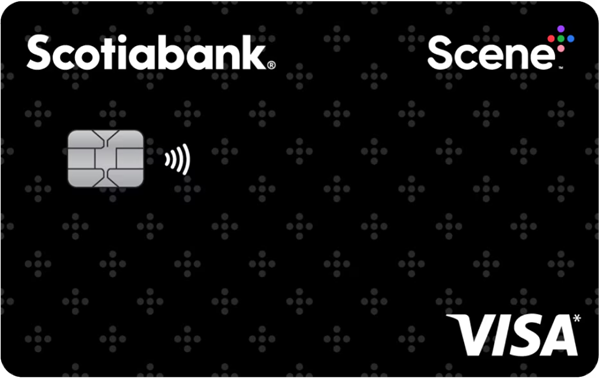
4.0
up to 5K pts
Welcome offerGood
Suggested credit scoreEarn up to 5,000 bonus Scene+ points within your first year.
Expires
Nov 1, 2024
Pros
-
No annual fee
-
Generous rewards with 2X points at Cineplex and grocery stores
-
Low redemption thresholds for various rewards
-
5,000 bonus Scene+ points as a sign-up bonus
-
Points don't expire
-
Car rental savings up to 25%
Cons
-
Limited earning potential for high spenders
-
Limited travel-related benefits compared to travel cards
-
Focus on entertainment and dining rewards may not suit all users
-
Limited sign-up bonus compared to cards with annual fees
-
Car rental savings limited to specific locations
Eligibility
Good
Recommended Credit Score
Recommended Credit Score
Good
2x
Scene+ points¹ on every $1 you spend at Sobeys, Safeway, IGA, Foodland, participating Co-ops, Freshco and more
2x
Scene+ points¹ for every $1 you spend on Home Hardware, Home Building Center, Home Furniture locations in Canada and online at homehardware.ca
2x
Scene+ points¹ for every $1 you spend at Cineplex theatres or online at cineplex.com
1x
Scene+ point for every $1 spent on all other eligible everyday purchases
25%
Save up to 25% off base rates at participating Avis locations and participating Budget locations in North America.
Scene+ points¹ on every $1 you spend at Sobeys, Safeway, IGA, Foodland, participating Co-ops, Freshco and more
2x
Scene+ points¹ for every $1 you spend on Home Hardware, Home Building Center, Home Furniture locations in Canada and online at homehardware.ca
2x
Scene+ points¹ for every $1 you spend at Cineplex theatres or online at cineplex.com
2x
Scene+ point for every $1 spent on all other eligible everyday purchases
1x
Save up to 25% off base rates at participating Avis locations and participating Budget locations in North America.
25%
20.99%
Purchase APR
22.99%
Balance Transfer Rate
22.99%
Cash Advance APR
$0
Annual Fee $0 for each additional card
2.5%
Foreign Transaction Fee
Purchase APR
20.99%
Balance Transfer Rate
22.99%
Cash Advance APR
22.99%
Annual Fee
$0
Foreign Transaction Fee
2.5%
Pros
-
No annual fee
-
Generous rewards with 2X points at Cineplex and grocery stores
-
Low redemption thresholds for various rewards
-
5,000 bonus Scene+ points as a sign-up bonus
-
Points don't expire
-
Car rental savings up to 25%
Cons
-
Limited earning potential for high spenders
-
Limited travel-related benefits compared to travel cards
-
Focus on entertainment and dining rewards may not suit all users
-
Limited sign-up bonus compared to cards with annual fees
-
Car rental savings limited to specific locations
Eligibility
Good
Recommended Credit Score
Recommended Credit Score
Good
2x
Scene+ points¹ on every $1 you spend at Sobeys, Safeway, IGA, Foodland, participating Co-ops, Freshco and more
2x
Scene+ points¹ for every $1 you spend on Home Hardware, Home Building Center, Home Furniture locations in Canada and online at homehardware.ca
2x
Scene+ points¹ for every $1 you spend at Cineplex theatres or online at cineplex.com
1x
Scene+ point for every $1 spent on all other eligible everyday purchases
25%
Save up to 25% off base rates at participating Avis locations and participating Budget locations in North America.
Scene+ points¹ on every $1 you spend at Sobeys, Safeway, IGA, Foodland, participating Co-ops, Freshco and more
2x
Scene+ points¹ for every $1 you spend on Home Hardware, Home Building Center, Home Furniture locations in Canada and online at homehardware.ca
2x
Scene+ points¹ for every $1 you spend at Cineplex theatres or online at cineplex.com
2x
Scene+ point for every $1 spent on all other eligible everyday purchases
1x
Save up to 25% off base rates at participating Avis locations and participating Budget locations in North America.
25%
20.99%
Purchase APR
22.99%
Balance Transfer Rate
22.99%
Cash Advance APR
$0
Annual Fee $0 for each additional card
2.5%
Foreign Transaction Fee
Purchase APR
20.99%
Balance Transfer Rate
22.99%
Cash Advance APR
22.99%
Annual Fee
$0
Foreign Transaction Fee
2.5%
Best travel credit card for students
CIBC Aeroplan® Visa* Card
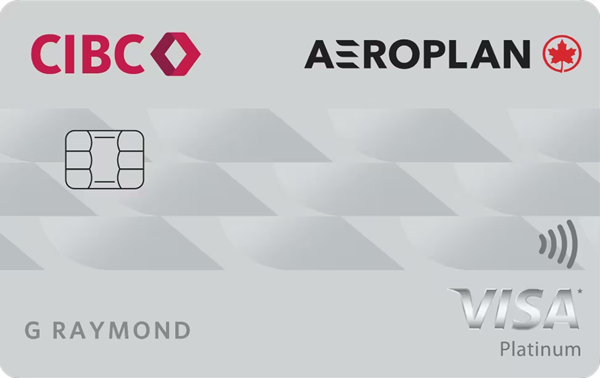
4.3
up to 10K pts
Welcome offerFair
Suggested credit scoreEarn up to 10,000 Aeroplan points (up to $200 in value). This offer is not available for residents of Quebec.
Pros
-
Earn one Aeroplan point per dollar spent on gas, electric vehicle charging, groceries, and with Air Canada directly, including Air Canada Vacations
-
Earn twice the points at over 150 Aeroplan partners and over 170 online retailers through the Aeroplan eStore
-
No annual fee
Cons
-
You only earn one point for every $1.50 spent on everything else
-
No travel insurance
-
No lounge access
Eligibility
Fair
Recommended Credit Score
$15,000
Required Annual Household Income
Recommended Credit Score
Fair
Required Annual Household Income
$15,000
1 point
for every $1 you spend on eligible gas, electric vehicle charging, groceries and with Air Canada directly, including through Air Canada Vacations®
1 point
for every $1.50 you spend on all other purchases.
2x
Earn points twice at over 150 Aeroplan partners and over 170 online retailers through the Aeroplan eStore.
for every $1 you spend on eligible gas, electric vehicle charging, groceries and with Air Canada directly, including through Air Canada Vacations®
1 point
for every $1.50 you spend on all other purchases.
1 point
Earn points twice at over 150 Aeroplan partners and over 170 online retailers through the Aeroplan eStore.
2x
20.99%
Purchase APR non-Quebec residents†
22.99%
Balance Transfer Rate 21.99% for Quebec residents
22.99%
Cash Advance APR 21.99% for Quebec residents
$0
Annual Fee $0 for up to 3 additional cards
2.5%
Foreign Transaction Fee 2.5% of the transaction in CDN
Purchase APR
20.99%
Balance Transfer Rate
22.99%
Cash Advance APR
22.99%
Annual Fee
$0
Foreign Transaction Fee
2.5%
Pros
-
Earn one Aeroplan point per dollar spent on gas, electric vehicle charging, groceries, and with Air Canada directly, including Air Canada Vacations
-
Earn twice the points at over 150 Aeroplan partners and over 170 online retailers through the Aeroplan eStore
-
No annual fee
Cons
-
You only earn one point for every $1.50 spent on everything else
-
No travel insurance
-
No lounge access
Eligibility
Fair
Recommended Credit Score
$15,000
Required Annual Household Income
Recommended Credit Score
Fair
Required Annual Household Income
$15,000
1 point
for every $1 you spend on eligible gas, electric vehicle charging, groceries and with Air Canada directly, including through Air Canada Vacations®
1 point
for every $1.50 you spend on all other purchases.
2x
Earn points twice at over 150 Aeroplan partners and over 170 online retailers through the Aeroplan eStore.
for every $1 you spend on eligible gas, electric vehicle charging, groceries and with Air Canada directly, including through Air Canada Vacations®
1 point
for every $1.50 you spend on all other purchases.
1 point
Earn points twice at over 150 Aeroplan partners and over 170 online retailers through the Aeroplan eStore.
2x
20.99%
Purchase APR non-Quebec residents†
22.99%
Balance Transfer Rate 21.99% for Quebec residents
22.99%
Cash Advance APR 21.99% for Quebec residents
$0
Annual Fee $0 for up to 3 additional cards
2.5%
Foreign Transaction Fee 2.5% of the transaction in CDN
Purchase APR
20.99%
Balance Transfer Rate
22.99%
Cash Advance APR
22.99%
Annual Fee
$0
Foreign Transaction Fee
2.5%
Best credit card for foreign students in Canada
Koho Mastercard
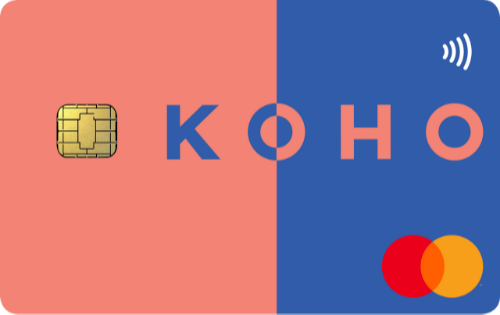
3.9
Poor
Suggested credit scoreto receive the latest news, tips and offers by email
Pros
-
A no-fee account option
-
Earn up to 5% cash back on your purchases
-
Accepted worldwide, wherever Mastercard is accepted
-
Four account tiers, so there’s something for everyone
-
Earn interest on your account
-
RoundUps feature helps you save
-
Financial coaching is available
-
Features like Credit Building (to help you build your credit history) and Cover (to protect you from overdrawing your account)
-
Compatible with Apple Pay
-
Joint account option for families and couples
Cons
-
No physical branches or tellers
-
No RRSP, TFSA or RESP accounts
-
Customer service not on par with the big banks
-
Missing some banking features, like wire transfers, currency exchanges and multiple lines of business like financial planning, mortgages and insurance
Eligibility
Poor
Recommended Credit Score
$0
Required Annual Personal Income
$0
Required Annual Household Income
Recommended Credit Score
Poor
Required Annual Personal Income
$0
Required Annual Household Income
$0
1%
cash back on groceries and transportation
3%
interest earned on your account balance
cash back on groceries and transportation
1%
interest earned on your account balance
3%
$0
Annual Fee Option to add credit building (price available in app)
Annual Fee
$0
Pros
-
A no-fee account option
-
Earn up to 5% cash back on your purchases
-
Accepted worldwide, wherever Mastercard is accepted
-
Four account tiers, so there’s something for everyone
-
Earn interest on your account
-
RoundUps feature helps you save
-
Financial coaching is available
-
Features like Credit Building (to help you build your credit history) and Cover (to protect you from overdrawing your account)
-
Compatible with Apple Pay
-
Joint account option for families and couples
Cons
-
No physical branches or tellers
-
No RRSP, TFSA or RESP accounts
-
Customer service not on par with the big banks
-
Missing some banking features, like wire transfers, currency exchanges and multiple lines of business like financial planning, mortgages and insurance
Eligibility
Poor
Recommended Credit Score
$0
Required Annual Personal Income
$0
Required Annual Household Income
Recommended Credit Score
Poor
Required Annual Personal Income
$0
Required Annual Household Income
$0
1%
cash back on groceries and transportation
3%
interest earned on your account balance
cash back on groceries and transportation
1%
interest earned on your account balance
3%
$0
Annual Fee Option to add credit building (price available in app)
Annual Fee
$0
Best student Mastercard in Canada
Tangerine Money-Back Credit Card
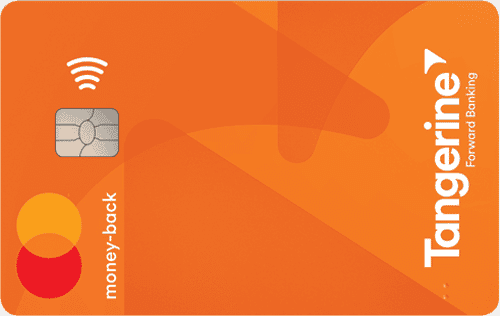
4.0
10% back
Welcome offerGood
Suggested credit scoreGet 10% cash back on up to $1,000 in everyday purchases made within 2 months. Pay only 1.95% balance transfer interest for the first 6 months.
Expires
Nov 1, 2024
Pros
-
No annual fee
-
Choose the spending categories where you want to earn the most cash back
-
Unlimited cash back—no maximum spending limit for any purchase category
-
Cash back is paid out monthly rather than annually
-
Periodically includes a special welcome offer where you can get extra cash back
-
1.95% interest on balance transfers for the first 6 months (1% transfer fee applies)*
Cons
-
Regular cash back rates are still lower than what you can get from a card with an annual fee
-
Limited extra perks or benefits beyond the cash back and balance transfer promotion
-
Generally not a good fit for shopping at warehouse clubs or wholesale grocers like Costco or Walmart
-
Tangerine does not have any physical bank branches
Eligibility
Good
Recommended Credit Score
$12,000
Required Annual Personal Income
Recommended Credit Score
Good
Required Annual Personal Income
$12,000
2%
Earn 2% cash back on 2 categories of your choice (e.g. groceries, recurring bills, gas, drug stores, etc.)
3
Get a Tangerine Savings account and add a 3rd 2% cash back category.
0.5%
Earn 0.50% on all your other everyday purchases.
Earn 2% cash back on 2 categories of your choice (e.g. groceries, recurring bills, gas, drug stores, etc.)
2%
Get a Tangerine Savings account and add a 3rd 2% cash back category.
3
Earn 0.50% on all your other everyday purchases.
0.5%
19.95% - 24.95%
Variable APR
1.95%
Balance Transfer Rate 19.95%
19.95%
Cash Advance APR $3.50 within Canada, $5.00 outside Canada
$0
Annual Fee $0 for additional cardholders
2.5%
Foreign Transaction Fee
Variable APR
19.95% - 24.95%
Balance Transfer Rate
1.95%
Cash Advance APR
19.95%
Annual Fee
$0
Foreign Transaction Fee
2.5%
Pros
-
No annual fee
-
Choose the spending categories where you want to earn the most cash back
-
Unlimited cash back—no maximum spending limit for any purchase category
-
Cash back is paid out monthly rather than annually
-
Periodically includes a special welcome offer where you can get extra cash back
-
1.95% interest on balance transfers for the first 6 months (1% transfer fee applies)*
Cons
-
Regular cash back rates are still lower than what you can get from a card with an annual fee
-
Limited extra perks or benefits beyond the cash back and balance transfer promotion
-
Generally not a good fit for shopping at warehouse clubs or wholesale grocers like Costco or Walmart
-
Tangerine does not have any physical bank branches
Eligibility
Good
Recommended Credit Score
$12,000
Required Annual Personal Income
Recommended Credit Score
Good
Required Annual Personal Income
$12,000
2%
Earn 2% cash back on 2 categories of your choice (e.g. groceries, recurring bills, gas, drug stores, etc.)
3
Get a Tangerine Savings account and add a 3rd 2% cash back category.
0.5%
Earn 0.50% on all your other everyday purchases.
Earn 2% cash back on 2 categories of your choice (e.g. groceries, recurring bills, gas, drug stores, etc.)
2%
Get a Tangerine Savings account and add a 3rd 2% cash back category.
3
Earn 0.50% on all your other everyday purchases.
0.5%
19.95% - 24.95%
Variable APR
1.95%
Balance Transfer Rate 19.95%
19.95%
Cash Advance APR $3.50 within Canada, $5.00 outside Canada
$0
Annual Fee $0 for additional cardholders
2.5%
Foreign Transaction Fee
Variable APR
19.95% - 24.95%
Balance Transfer Rate
1.95%
Cash Advance APR
19.95%
Annual Fee
$0
Foreign Transaction Fee
2.5%
Best American Express credit card for students
SimplyCash® Card from American Express
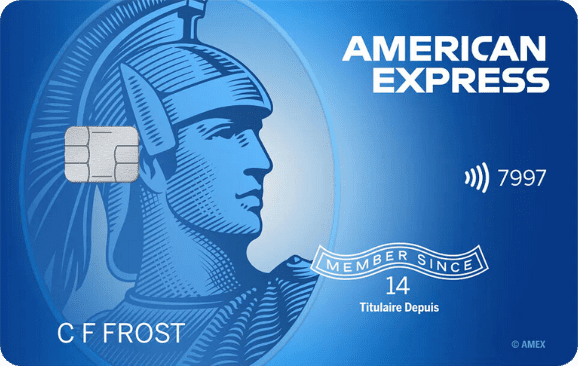
3.5
bonus 5% back
Welcome offerGood
Suggested credit scoreEarn a bonus 5% cash back on purchases in your first 3 months (up to $2,000 in purchases).
Pros
-
No annual fee for primary or additional cardholders
-
Solid regular cash back rate on all eligible purchases - up to 2% cash back on all eligible purchases
-
No limit to the amount of cash back you can earn at the base rate
Cons
-
Cash back is only applied as a statement credit once a year
-
Amex cards aren’t accepted by every merchant
Eligibility
Good
Recommended Credit Score
$0
Required Annual Personal Income
Recommended Credit Score
Good
Required Annual Personal Income
$0
2%
cash back on eligible gas station purchases in Canada
2%
cash back on eligible grocery store purchases in Canada (up to $300 cash back annually)
1.25%
cash back on all other purchases
cash back on eligible gas station purchases in Canada
2%
cash back on eligible grocery store purchases in Canada (up to $300 cash back annually)
2%
cash back on all other purchases
1.25%
21.99%
Purchase APR
21.99%
Cash Advance APR *
$0
Annual Fee No annual fee
2.5%
Foreign Transaction Fee
Purchase APR
21.99%
Cash Advance APR
21.99%
Annual Fee
$0
Foreign Transaction Fee
2.5%
Pros
-
No annual fee for primary or additional cardholders
-
Solid regular cash back rate on all eligible purchases - up to 2% cash back on all eligible purchases
-
No limit to the amount of cash back you can earn at the base rate
Cons
-
Cash back is only applied as a statement credit once a year
-
Amex cards aren’t accepted by every merchant
Eligibility
Good
Recommended Credit Score
$0
Required Annual Personal Income
Recommended Credit Score
Good
Required Annual Personal Income
$0
2%
cash back on eligible gas station purchases in Canada
2%
cash back on eligible grocery store purchases in Canada (up to $300 cash back annually)
1.25%
cash back on all other purchases
cash back on eligible gas station purchases in Canada
2%
cash back on eligible grocery store purchases in Canada (up to $300 cash back annually)
2%
cash back on all other purchases
1.25%
21.99%
Purchase APR
21.99%
Cash Advance APR *
$0
Annual Fee No annual fee
2.5%
Foreign Transaction Fee
Purchase APR
21.99%
Cash Advance APR
21.99%
Annual Fee
$0
Foreign Transaction Fee
2.5%
Best credit card for young adults
American Express® Green Card
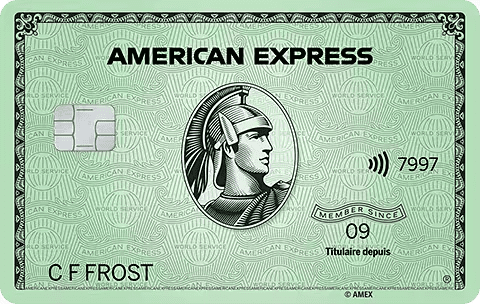
3.7
earn 10,000 pts
Welcome offerGood
Suggested credit scoreEarn 10,000 Membership Rewards® points*
Pros
-
No annual fee
-
No income requirements (unlike many other no-fee cards)
-
Welcome bonus up to 10,000 points (a $100 value)
-
American Express® Experiences
Cons
-
The card only offers basic extended warranty and purchase protection insurance. No travel insurance or rental car coverage
-
Some places might not accept American Express®. However, most major retailers do (more small businesses are starting to as well)
-
Fewer perks: No specific benefits for travel or dining and no accelerated earning rates on grocery
-
Lower earn rates: The reward earn rates are lower than some other no-fee credit cards
Eligibility
Good
Recommended Credit Score
$0
Required Annual Personal Income
$0
Required Annual Household Income
Recommended Credit Score
Good
Required Annual Personal Income
$0
Required Annual Household Income
$0
1x
the points on Card purchases
1
additional Membership Rewards® point for every $1 you charge to your American Express® Green Card on eligible hotel or car rental bookings made with American Express Travel
the points on Card purchases
1x
additional Membership Rewards® point for every $1 you charge to your American Express® Green Card on eligible hotel or car rental bookings made with American Express Travel
1
21.99%
Purchase APR
21.99%
Cash Advance APR
$0
Annual Fee No annual fee
2.5%
Foreign Transaction Fee
Purchase APR
21.99%
Cash Advance APR
21.99%
Annual Fee
$0
Foreign Transaction Fee
2.5%
Pros
-
No annual fee
-
No income requirements (unlike many other no-fee cards)
-
Welcome bonus up to 10,000 points (a $100 value)
-
American Express® Experiences
Cons
-
The card only offers basic extended warranty and purchase protection insurance. No travel insurance or rental car coverage
-
Some places might not accept American Express®. However, most major retailers do (more small businesses are starting to as well)
-
Fewer perks: No specific benefits for travel or dining and no accelerated earning rates on grocery
-
Lower earn rates: The reward earn rates are lower than some other no-fee credit cards
Eligibility
Good
Recommended Credit Score
$0
Required Annual Personal Income
$0
Required Annual Household Income
Recommended Credit Score
Good
Required Annual Personal Income
$0
Required Annual Household Income
$0
1x
the points on Card purchases
1
additional Membership Rewards® point for every $1 you charge to your American Express® Green Card on eligible hotel or car rental bookings made with American Express Travel
the points on Card purchases
1x
additional Membership Rewards® point for every $1 you charge to your American Express® Green Card on eligible hotel or car rental bookings made with American Express Travel
1
21.99%
Purchase APR
21.99%
Cash Advance APR
$0
Annual Fee No annual fee
2.5%
Foreign Transaction Fee
Purchase APR
21.99%
Cash Advance APR
21.99%
Annual Fee
$0
Foreign Transaction Fee
2.5%
How to compare the best student credit cards
Choosing the best student credit card as a Canadian university student is the first step in building good credit and a great way to reap benefits like cashback rewards. To help, here are eight easy tips to pick a Canadian student credit card. To learn more, check out the Money.ca guides on best cash back credit cards and best reward credit cards.
Compare the best student credit cards in Canada: Summary
Here's a quick comparison of all the best student credit cards mentioned in this article.
| Student credit card | Best for | Get started |
|---|---|---|
| BMO CashBack® MasterCard® | 3% cash back on groceries, no annual fee, no minimum income requirement | Apply now |
| RBC Cash Back Mastercard | 2% unlimited cash back on groceries, no annual fee | Apply now |
| CIBC Dividend® Visa* Card | 2% cash back on groceries, no annual fee, | Apply now |
| TD Rewards Visa* Card | Booking travel, no annual fee, no minimum income requirement | Apply now |
| Scotia Momentum No-Fee Visa Card | 1% cash back on gas, groceries, drug stores, recurring payments, no annual fee | Apply now |
| Scotiabank® Scene+™ Visa* Card | Scene+ points, no annual fee | Apply now |
| CIBC Aeroplan® Visa* Card | Aeroplan points, no annual fee | Apply now |
| Koho Mastercard | Prepaid rewards and building credit, no annual fee | Apply now |
| RBC ION+ Visa | Avion points | Apply now |
| Tangerine Money-Back Credit Card | 2% cash back categories, no annual fee | Apply now |
| SimplyCash® Card from American Express | 2% cash back on eligible gas and groceries, no annual fee | Apply now |
| American Express® Green Card | 1 Membership Rewards point per $1 spent, no annual fee | Apply now |
Why get a student credit card in Canada?
Despite the many warnings, we believe student credit cards play an important role in helping you establish credit history and a good credit score by the time you graduate (essential for car leases, mortgages, retail financing and more).
Read: The ultimate guide to credit scores in Canada
Credit cards are essential for many online transactions and reservations (hotel, car rental) and offer richer rewards than using a debit card.
Is opening a student credit card a good idea?
Yes, in many cases opening a student credit card can be a great idea and will build your credit rating for important future purchases—if you use it responsibly. Both overspending and not paying your bills on time can have a longstanding and potentially devastating impact on your credit rating and will prevent you from building credit that benefits you. Plus, you do not want to spend your first year as a student in credit card debt.
To help you choose the best student credit card for you, we’ve put together a list of our top-rated Canadian student credit cards, based on fees, rewards and ease of approval.
† Conditions apply
Expert tip: Using a student credit card to build credit and earn rewards
Apply for a student credit card as soon as possible. Use it responsibly and grow your credit score to give yourself a financial step up. Applying for a credit card as a student might be daunting but it’s one of the smartest decisions you can make to help you get ahead and build credit. Student credit cards are fantastic tools to help manage your college/university and day-to-day expenses. Plus, many of these credit cards also come with perks like rewards or cash back. But, you do have to be careful. A credit card comes with a lot of responsibility that can have a big impact for many years to come. However, when used responsibly and correctly, a student credit card will teach you a lot about personal finances and help set you up for a stronger financial future.
—Hannah Logan, Money.ca credit card, saving and travel expert
What should you consider when choosing a top student credit card?
Choosing the right credit card for you is extremely important. If you don’t take a close look at the fine print and main features of your credit card, you risk choosing one that doesn’t suit you and your financial habits and needs. You want your student credit card to do more than just help you spend money.
Here are some things you should consider before applying for a credit card:
Minimum income requirement
As a student, you may not have the capacity to work a job while studying. Student credit card issuers are generally aware of this, though often still require proof of income. Whether you work part-time, full-time or not at all, it’s important to take note of the minimum income requirement for a credit card to determine if you are eligible or potentially need a co-signer.
Credit score requirement
Depending on the credit card issuer, you may need to provide any credit history you already have. Some options don’t require a credit history for students, considering they are likely just getting started with building their credit.
Read: How do student loans affect your credit score?
Minimum funds needed in your account
Similarly to the minimum income requirement, you may need to have a minimum amount of funds already in your account. It’s important to note this beforehand to make sure you have the base you need before applying for your credit card.
Perks and rewards
One of the best things about credit cards is the perks and rewards that come along with them. These perks could be anything from student discounts at certain retailers to rewards points or cash back on purchases you make. It is important to make sure the rewards and perks your credit card offers suit your spending style as closely as possible.
For example, if you don’t go to the movies often, then a card with points toward movie tickets might not be your best choice. On the other hand, if you use transit to get to school and a card offers cash back on transportation, you may want to lock in that perk and ultimately earn yourself some extra cash!
Annual fee
Some credit cards require you to pay an annual fee. These fees usually range from $100-$150. Often, credit cards with many rewards and perks are more likely to charge an annual fee as the rewards typically outweigh the cost of the fee in the long run. However, there are credit cards with no annual fees available as well that are likely better suited for a student’s lifestyle.
Read: Why pay for a credit card with an annual fee?
Bank reputation and reviews
Be sure to look into a bank’s reputation and customer reviews before applying for a credit card with them. You want to ensure you’re getting the best service possible, especially if this is your first credit card in your personal finance journey. If the customer service isn’t reputable, you may not want to get a credit card from that company.
Read: Best banks in Canada
Recommendations from friends
If you’re not sure what student credit card to apply for, ask around! Chances are you’ve got some friends who have been in the same life phase as you. They’ll have advice on what’s worked for their finances and what might be best for you. This also allows you to get honest opinions from people you know and trust.
Your spending habits
Reflect on your spending habits and the prospect of taking on the responsibility of having a credit card. Track your past spending habits and create a budget to ensure you use your credit card wisely.
Pros and cons
Pros
-
You have the chance to build credit, which in turn will help you with future financial endeavours like renting housing
-
You can earn rewards and cash back
-
Purchase protection
-
They are useful if you’re in a financial pinch and need to purchase a necessity
-
You can track your spending
Cons
-
You might be tempted to overspend
-
Low credit limits
-
Paying your credit card or risk developing bad credit
-
Fees can sneak up on you
How to apply for a student credit card in Canada
Applying for a student credit card is simple. As long as you have what you need ready to go, this process should run smoothly. Here’s a step by step look at how to apply for a student credit card:
- 1.
Do your research. First things first, research student credit cards to decide which is best for you and your spending habits based on its eligibility requirements, perks, discounts, rewards and reviews.
- 2.
Ensure you meet eligibility requirements. Typically, this means you must be a Canadian resident of the age of majority in your province, be a post-secondary student, have not declared bankruptcy in the past 7 years, and overall have a clean financial history.
- 3.
Gather your paperwork. Make sure you have proof that you meet the eligibility requirements listed in the second step.
- 4.
Fill out an application form. Once you’ve determined which card you’d like to apply for, you can submit an application either in person at your bank or online. Your credit card applications shouldn’t take you more than 15 minutes to submit.
- 5.
Wait for approval. If you’ve been approved, your credit card provider should reach out to you shortly (3-5 days) to confirm your approval before sending you your new student credit card in the mail.
Can you apply for a credit card without a job?
In short, yes, you can apply for a student credit card without a job. Some credit card providers may require proof of income along with your application (which will be verified with the credit bureau), but if you don’t have full- or part-time work, you can provide them with an alternate form of income to prove you’d be able to pay off any accumulated expenses. This may come from a student loan, personal savings, or help from a parent or guardian.
Can international students get credit cards in Canada?
Yes! There are currently five financial institutions that offer up to $1,000 of credit to newly arrived international students: BMO, Scotiabank, CIBC, RBC and HSBC. And while TD Canada does offer credit to international students, they will only offer secured credit cards (credit cards with a security deposit) to students who have just arrived in Canada.
What is the easiest student credit card to get?
The Scotiabank® SCENE+ Visa* Card, the Tangerine Money-Back Credit Card, and the BMO CashBack® Mastercard®* for Students are the easiest cards to get approved for as a student. Plus, none of these cards have an annual fee.
Tips for getting approved for a student credit card
Since your student credit card is likely your first credit card, you may be intimidated by the prospect of getting approved or denied. But don’t worry. If you’re just getting started with credit-building and have zero to limited credit, there’s likely not much standing in the way between you and your credit card. But to be safe, here are some tips to help you get approved and make the whole process as simple as it can be:
- Consider getting a co-signer
- Ensure you meet eligibility requirements
- Be thorough in your application and ensure you don’t make mistakes regarding your personal information or financial documents
- Consider getting a part-time job as an income source
- Maintain good financial habits
General credit card tips for students
So, you’ve got your student credit card, now what? It’s important to use the card properly in order to help build your credit score successfully:
- Pay your bill in full and on time, or at least make the minimum payments.
- Charge regular bill payments like your phone bill automatically to your credit card
- Try not to use more than 30% of your credit limit
- Build a budget and include your credit card bill payments in it
- Track your spending to make sure no mistakes or surprise fees are being charged to your card
FAQs about student credit cards
What’s the difference between a student credit card and a student line of credit?
A student line of credit allots you a certain amount of available credit and you must pay back whatever amount you end up borrowing. Typically, a line of credit offers a higher credit limit and a more flexible repayment schedule, though it doesn’t offer any rewards, perks or cash back.
Final word
Being a student means you’re already busy enough with things like academics, extracurriculars and networking. Worrying about your finances is a stress you don’t need to add to the list. By choosing a credit card that suits your lifestyle and personal finances you can reap some great rewards and discounts, save yourself some money and focus on hitting the books!
You’ll also have peace of mind knowing that you don’t need to worry about switching your credit card until after you’re done with school—and even then, you have options for your student credit card after you graduate.
If you’re buying your own course books, spending money on groceries, or buying a monthly public transit pass, there’s no reason you shouldn’t be earning rewards on each purchase with a credit card. A student card can help you build credit and practice financial responsibility. And trust me, post-graduate you will thank yourself when tackling things like car leases, mortgages, rental housing and retail financing is made easier by the credit you built using your student credit card.
Related articles:
- Best student chequing accounts
- Everything you need to know about student loans
- What’s the best age to get a credit card?
American Express is not responsible for maintaining or monitoring the accuracy of information on this website. For full details and current product information click the Apply now link. Conditions apply.
BMO is not responsible for maintaining the content on this site. Please click on the Apply now link for the most up to date information.

Em Norton is a Staff Writer for Money.ca. Em holds a B.A. in Professional Writing from York University and has been writing professionally since 2019. Em's work has previously been published by Room Magazine, IN Magazine, Our Canada and more.

Jack has an undergraduate degree in journalism from Carleton University and a master's of Urban Planning from Toronto Metropolitan University. Over the years Jack has written for not-for-profits like World Vision and WE Charity, shot video content for accelerators like Techstars, and co-authored urban planning papers with organizations such as Parkdale's Neighbourhood Land Trust. Jack currently specializes in real estate and investing news.
Disclaimer
The content provided on Money.ca is information to help users become financially literate. It is neither tax nor legal advice, is not intended to be relied upon as a forecast, research or investment advice, and is not a recommendation, offer or solicitation to buy or sell any securities or to adopt any investment strategy. Tax, investment and all other decisions should be made, as appropriate, only with guidance from a qualified professional. We make no representation or warranty of any kind, either express or implied, with respect to the data provided, the timeliness thereof, the results to be obtained by the use thereof or any other matter. Advertisers are not responsible for the content of this site, including any editorials or reviews that may appear on this site. For complete and current information on any advertiser product, please visit their website.





